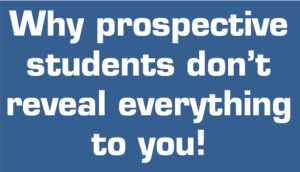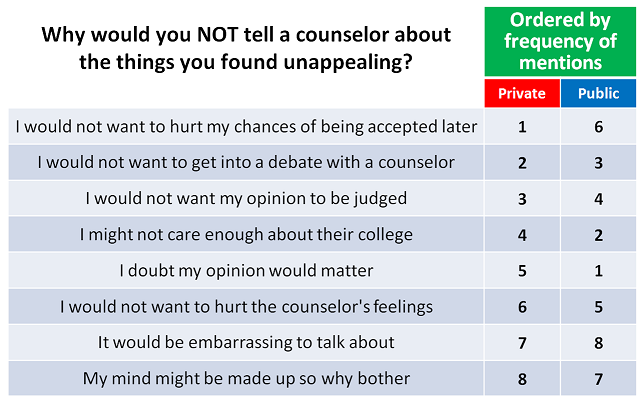Just what are the traits of an exceptional Admission Counselor? Google it and this is what you’ll find: Excellent writing and speaking skills,  ability to relate positively to a wide variety of people, enthusiastic, organized, professional in appearance and demeanor, familiarity with technology and data driven systems, able to work both independently and in a team setting, excellent time management skills, and so on. All clearly important attributes for a role that has enormous impact on any college’s recruiting success. But what if prospective students were writing your job description? How would it be different from the stock descriptions you find in a standard job opening announcement?
ability to relate positively to a wide variety of people, enthusiastic, organized, professional in appearance and demeanor, familiarity with technology and data driven systems, able to work both independently and in a team setting, excellent time management skills, and so on. All clearly important attributes for a role that has enormous impact on any college’s recruiting success. But what if prospective students were writing your job description? How would it be different from the stock descriptions you find in a standard job opening announcement?
Here are some clues: In a our co-sponsored study, “The Relationship Dynamic,” 38% of college-bound students said that their college admission counselor played a significant role in helping them form a relationship the college they chose.
In a separate study, “The Value Proposition,” students were asked to identify and quantify the relative influence of specific interactions on their relationship with the college they selected. Across the board, the students rated social media in the neutral range whereas interaction with admission counselors rated much higher, demonstrating a far greater influence on enrollment.
What do students say counselors MUST do?
In our recently released study, “Hidden Influences,” over 18,000 prospective students are very clear about what they want from a counselor. Topping the list: Answer their questions. ALL of their questions, completely!
While this may be impossible in a practical sense, students have a very high expectation that counselors have an answer for their every question. They expect counselors to be knowledgeable about issues relating to cost, financial aid, history of the institution, outcomes, deadlines, classes required for specific majors and so on.
Don’t say, “I don’t know.” Instead say, “I’ll find out.” And do it!
If the counselor cannot answer a specific question they expect the counselor to find the answer and get back to them in a timely manner.
Students say they develop a strong affinity for a counselor who is well-informed and responsive. It is a key ingredient in their formation of a relationship with the college as a whole and it is influential in college selection.
On the opposite end of the spectrum, students voiced their frustrations with counselors who are unable to answer questions and cited examples of counselors who actually avoided questions and requests for information that fall outside the most basic.
Many students shared experiences where a counselor had given them information that they later discovered is “wrong” and “inaccurate.” And, students have a very low tolerance for counselors who respond to specific questions with “vague” answers and information.
What qualities do top-notch admission counselors have that lead prospective students to enroll?
- They are knowledgeable and responsive. They know the answers to every question about their school, campus, costs, loans, scholarships, etc… And, if they are asked a question that they don’t have an answer for, they find out fast.
- They demonstrate a sincere interest in the student. They get to know the prospective student as an individual and understand his or her particular needs, preferences and motivations.
- They connect the student to people, places and activities that will create excitement about the college. Because they have mastered #2, they know just who those people, places and activities should be.
- They make sure to let the students know that the college is interested in them. They make the student feel wanted.
Here’s what admission counselors need to know.
You know that a student’s college selection is tied closely to the strength of the relationship they build with a college over time. And, you know that creating relationships is a multifaceted, nuanced and crucial part of student recruitment. But do you know this? Your role is crucial. You are a powerful motivator when you use all of the tools available to you.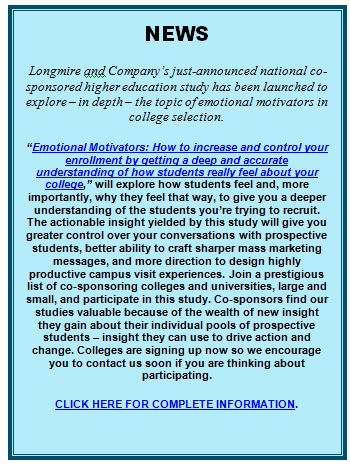
We help colleges and universities with their recruiting efforts every day. If we can help you, please let me know. If you’ve thought about helping your staff with professional development, now is the ideal time to train and motivate your staff. Email or call me if you are interested in how we can help. Continue the conversation on Twitter @LongmireCo. For more information about Longmire and Company and the tools we have to offer, click here. We will be sharing more key insights from our studies so be sure to subscribe to Versions of Conversion today so you can stay up-to-date.
 Rick Montgomery is as an Enrollment Strategist at Longmire and Company. With over 20 years in higher education marketing, he brings an innovative and dynamic approach to helping colleges and universities meet their enrollment goals. Rick can be reached at 913/492.1265 x.708 or via email at rmontgomery@longmire-co.com.
Rick Montgomery is as an Enrollment Strategist at Longmire and Company. With over 20 years in higher education marketing, he brings an innovative and dynamic approach to helping colleges and universities meet their enrollment goals. Rick can be reached at 913/492.1265 x.708 or via email at rmontgomery@longmire-co.com.
 For most colleges “Yield Season” extends all the way up to the day new students show up for class. While the majority of prospective students may have made their college selection decision at this point, a sizable number are still considering their options. They are still looking at you and other colleges.
For most colleges “Yield Season” extends all the way up to the day new students show up for class. While the majority of prospective students may have made their college selection decision at this point, a sizable number are still considering their options. They are still looking at you and other colleges.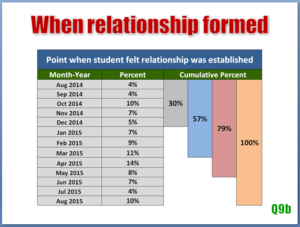
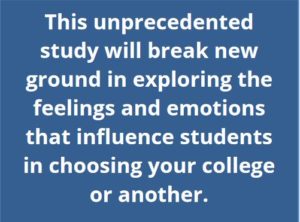 uncover why they feel that way, to give you a deeper understanding of the students you’re trying to recruit. The actionable insight yielded by this study will give you greater control over your conversations with prospective students, better ability to craft sharper mass marketing messages, and more direction to design highly productive campus visit experiences.
uncover why they feel that way, to give you a deeper understanding of the students you’re trying to recruit. The actionable insight yielded by this study will give you greater control over your conversations with prospective students, better ability to craft sharper mass marketing messages, and more direction to design highly productive campus visit experiences.